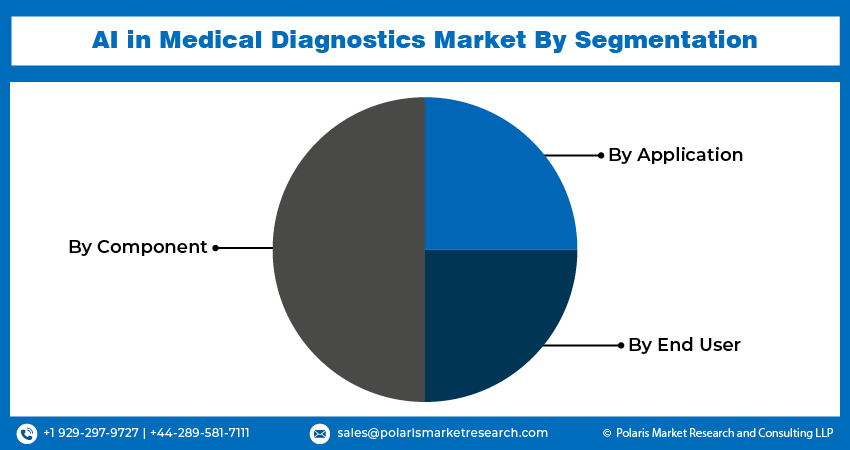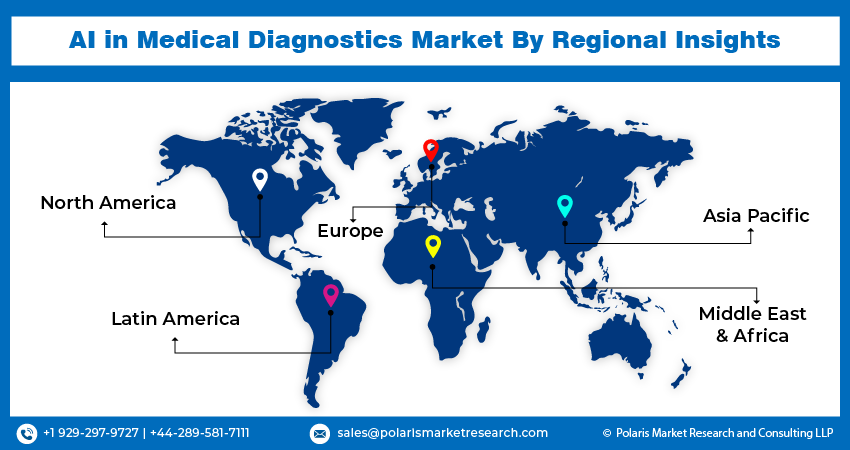
Artificial Intelligence (AI) in Medical Diagnostics Market Share, Size, Trends, Industry Analysis Report, By Component (Software, Hardware, and Services); By Application; By End User; By Region; Segment Forecast, 2023 - 2032
- Published Date:Jan-2024
- Pages: 116
- Format: PDF
- Report ID: PM3407
- Base Year: 2022
- Historical Data: 2019-2021
Report Outlook
The global artificial intelligence (AI) in medical diagnostics market was valued at USD 1.08 billion in 2022 and is expected to grow at a CAGR of 39.7% during the forecast period.
Artificial intelligence carries pronounced promise in assisting healthcare donors to acquire perception and enhance healthcare results. Although several questions remain regarding its security, control, and influence, the usage of AI in clinical care is not limited to infancy and is anticipated to encounter substantial development in the near future. The artificial intelligence (AI) in medical diagnostics market size is expanding as AI is enhancing data processing, recognizing motifs, and creating perceptions that might, in other respects, evade detection from a physician's physical endeavor.
Artificial intelligence in medical diagnosis assists with medical administration, management, automation, admin, and enterprise. It can be utilized to detect cancer, triage crucial detections in medical imaging, point out critical deformities, offer radiologists assistance in organizing life-threatening situations, detect cardiac arrhythmias, forecast stroke results, and assist with the handling of detrimental illnesses. AI is a prosperous dominion of algorithms, data, analytics, deep learning, neural meshwork, and perceptions that are continuously evolving and adjusting to the requirements of the healthcare industry and its patients.
Rapid increase in the integration of artificial intelligence powered solutions across wide range of verticals for achieving better operational & clinical outcomes and rising prevalence of chronic diseases, that is creating huge demand for highly automated and innovative healthcare processes are key factors driving the growth of the market. In order to meet the growing need of AI in medical diagnostics to reduce human errors shortage of healthcare professionals, and provide better treatment facilities, major players are focusing on developing and introducing new solutions with advanced features, that is further influencing the market at rapid pace.
 in Medical Diagnostics Market.png)
To Understand More About this Research: Request a Free Sample Report
For instance, in December 2022, Digistain, announced the launch of its new revolutionary AI-based breast cancer diagnostic tool, that has passed clinical studies and gained clearance from the Medicines & Healthcare Regulatory Agency. This technology is quicker, cheaper, and effectively identifies patients who could safely avoid chemotherapy with over 99% accuracy.
Moreover, continuous advancements in the healthcare IT infrastructure and technological developments in computer processing, machine learning algorithms, and cloud storage, are significantly supporting the integration of AI-based systems in diagnostics for providing accurate & efficient diagnosis. In the recent years, big data and analytics solutions are being largely adopted especially with the rising use of EHRs, high-resolution radiology images, and digitized laboratory slides, that is opening huge potential for the market in the near future.
However, the high cost associated with the implementation & licensing of AI software and expensive imaging equipment especially in the low-income countries with lack of technology and access to advanced healthcare facilities, are major factors hindering the market growth.
The outbreak of the COVID-19 pandemic has significantly impacted the growth of the artificial intelligence (AI) in medical diagnostics market. The imposed lockdown and other movement restriction measures worldwide resulted is decreased public mobility and negatively impacted the diagnostic industry. Additionally, the rapid spread of the COVID-19 pandemic not only affected the global economy but also highly impacted the functioning of general hospitals for non-covid patients in hospitals worldwide.
 in Medical Diagnostics Market Info.png)
Industry Dynamics
Growth Drivers
With the extensive growth in the digitization trend and adoption of information systems across the healthcare industry, several large and complex data is generated at numerous stages in care delivery process and big data and analytical solutions have drastically grown in sophistication with the surging adoption of EHRs, digitized laboratory slides, and high-resolution radiology images, which are the primary factors fueling the demand and growth of the artificial intelligence (AI) in medical diagnostics market.
Furthermore, increasing practice of artificial intelligence in the areas of drug discovery, genomics, medical imaging sector, and precision medicine coupled with the various cumulative custom-made treatments tailored to particular patient necessity are also expected to boost the market growth. Escalating need and demand for artificial intelligence technology to accomplish data mining and fuel the healthcare delivery services speed and introduction to innovative and encouraging uses for the disease monitoring and identification across the globe, is further accelerating the demand and growth of the global market at significant pace.
Report Segmentation
The market is primarily segmented based on component, application, end user, and region.
|
By Component |
By Application |
By End User |
By Region |
|
|
|
|
To Understand the Scope of this Report: Speak to Analyst
Software segment is accounted for the largest market share in 2022
The growth of the segment can be largely attributed to its ability to provide healthcare providers a competitive edge over others, without facing several types of challenges including being short-staffed and surging imaging scan volumes. The rapid increase in the global population, that is being increasingly diagnosed with large array of chronic and acute diseases, has paved the pay for higher adoption of advanced AI-enabled solutions. The surge in the burden of healthcare infrastructure and lack of care providers along with the constant advancements in the healthcare systems and electronic health records with the implementation of AI-based solutions, are further likely to boost the growth of the segment in the coming years.
In vivo diagnostics segment held the significant market revenue share in 2022
The in vivo diagnostics segment held the maximum market revenue share in 2022, and is likely to retain its market position over the anticipated period. The continuous increase in the adoption and prevalence for these AI solutions across healthcare and medical industry due to its numerous advantages such as reducing the human errors and improve overall treatment efficacy.
Moreover, the in vitro diagnostics segment is expected to exhibit significant market growth over the coming years, on account of growing demand for these solutions to detect diseases and many other conditions and are being widely used to monitor patient’s health to help cure, treat, and prevent diseases. In addition, it is also used in the precision medicine to identify patients, who are likely to have benefitted from several specific treatments and therapies, which is fostering the growth of the market.
Hospitals segment is expected to witness highest growth over the forecast period
The hospitals segment is expected to grow at a high CAGR during the projected period, mainly due to surge in the number of diagnostic imaging treatments performed in the hospitals or being used as standard procedures coupled with the rising inclination of hospitals towards the automation and digitalization for various purposes including radiology patient workflow, boost the adoption of minimally invasive procedures in healthcare facilities to improve patient care quality and focus on patient centric care, and increasing adoption of improved imaging modalities to enhance overall workflow.

North America region dominated the global market in 2022
The North America region dominated the global market with majority market share in 2022, and is projected to maintain its dominance over the forecast period. The widespread presence of well-established healthcare IT infrastructure, continuous advancements in technology, emerging several new advanced healthcare-based startups, high digital literacy, and large number of favorable government initiatives, are among the major factors propelling the demand and growth of the market in the region.
Asia Pacific region is anticipated to be the fastest growing region with a healthy CAGR in the coming years, owing to growing number of private and public initiatives towards the adoption of AI-based medical diagnostic solutions and rising recognition and funding in countries like China, India, and Malaysia.
Additionally, the high prevalence for adoption several growth strategies by key players in the emerging economies and constant digitization of diagnostic infrastructure along with the growing geriatric population and rapid increase in cancer patients in the region, will further stimulate the growth of the market. According to Indian Council of Medical Research, the total number of cancer cases in India was estimated around 1.46 million in 2022, and is likely to reach over 1.57 million by 2025. One in every nine Indian is expected to have cancer in their lifetime, as the disease might increase by 12.8% from 2020 to 2025.

Competitive Insight
Some of the major players operating in the global market include Intel Corporation, Google, IBM Corporation, Microsoft Corporation, Enlitic Inc., Siemens Healthcare, Zebra Medical Vision Inc., Riverain Technologies, Imagen Technologies, GE Healthcare, Digital Diagnostics, HeartFlow, Arterys, International Business Machines, VUNO Inc., NovaSignal Corporation, and Agfa-Gevaert.
Recent Developments
- In April 2024, Happiest Mind Technologies Limited announced its partnership with MindSculpt Analytics. The new collaboration aims at leveraging artificial intelligence and machine learning technologies to offer advanced medical diagnostic solutions that focus on individual health and wellness.
- In December 2023, leading data analytics firm Enlitic announced it is entering into contractual agreements with global enterprise imaging partner Endex. The new collaboration aims at improving the standardization of medical imaging data. With the new partnership, Enlitic's data standardization software Endex will be integrated with Infinitt PACS.
- In November 2021, Royal Philips, introduced AI based MR portfolio of the diagnostic systems that has received the 510(k) clearance from the FDA. It helps is simplifying and automating complex clinical and operational tasks with the helium-free for life MR operations. The system is specially used to speed MR exams, smooth workflows, help ensuring the efficiency, and optimize diagnostic quality.
- In June 2021, Max Healthcare, introduced its new artificial intelligence powered device in collaboration with MyHealthcare, a digital health solutions provider, that is integrated with patient monitoring framework. Patients can easily use the platform Max MyHealth to monitor their vitals with clinical devices associated with the app.
Artificial Intelligence (AI) in Medical Diagnostics Market Report Scope
|
Report Attributes |
Details |
|
Market size value in 2024 |
USD 2.11 billion |
|
Revenue forecast in 2032 |
USD 30.76 billion |
|
CAGR |
39.7% from 2023– 2032 |
|
Base year |
2023 |
|
Historical data |
2019– 2022 |
|
Forecast period |
2024– 2032 |
|
Quantitative units |
Revenue in USD billion and CAGR from 2024 to 2032 |
|
Segments covered |
By Component, By Application, By End User, By Region |
|
Regional scope |
North America, Europe, Asia Pacific, Latin America; Middle East & Africa |
|
Key companies |
Intel Corporation, Google Inc., IBM Corporation, Microsoft Corporation, Enlitic Inc., Siemens Healthcare, Zebra Medical Vision Inc., Riverain Technologies, Imagen Technologies, GE Healthcare, Digital Diagnostics Inc., HeartFlow Inc., Arterys Inc., International Business Machines Corporation, VUNO Inc., NovaSignal Corporation, and Agfa-Gevaert Group. |
FAQ's
The global artificial intelligence (AI) in medical diagnostics market size is expected to reach USD 30.76 Billion by 2032.
Key players in the artificial intelligence (AI) in medical diagnostics market are Intel Corporation, Google, IBM Corporation, Microsoft Corporation, Enlitic Inc., Siemens Healthcare, Zebra Medical Vision Inc.
North America contribute notably towards the global artificial intelligence (AI) in medical diagnostics market.
The global artificial intelligence (AI) in medical diagnostics market is expected to grow at a CAGR of 39.7% during the forecast period.
The artificial intelligence (AI) in medical diagnostics market report covering key segments are component, application, end user, and region.
